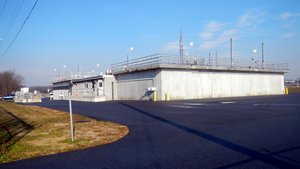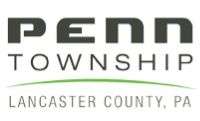Public Wastewater Utility
 Public sewer service is provided to Penn Township residents by the Northwestern Lancaster County Authority (NWLCA). This service area is generally located on the east and south sides of Manheim Borough, using a system of gravity and pressurized mains to convey wastewater from individual properties to the NWLCA’s treatment plant shown to the right. The wastewater system map is here.
Public sewer service is provided to Penn Township residents by the Northwestern Lancaster County Authority (NWLCA). This service area is generally located on the east and south sides of Manheim Borough, using a system of gravity and pressurized mains to convey wastewater from individual properties to the NWLCA’s treatment plant shown to the right. The wastewater system map is here.
On-Lot Disposal
 The vast majority of geographical area in Penn Township is not served by the NWLCA’s sewer system. For the most part these properties utilize some sort of on-lot sewage disposal such as a septic tank and drainfield, although some areas rely upon private community treatment facilities.
The vast majority of geographical area in Penn Township is not served by the NWLCA’s sewer system. For the most part these properties utilize some sort of on-lot sewage disposal such as a septic tank and drainfield, although some areas rely upon private community treatment facilities.
On-lot septic systems are required to be inspected, maintained, and at least every three years – pumped. The township tracks this and reminds landowners when it is their time to do this important work. A list of Registered Septic Haulers is maintained by the township, too.
The U.S. EPA has an informational SepticSmart initiative aimed at providing good information for homeowners to save money, keep drinking water safe, and help the environment. Since replacement on-lot systems can be expensive, if at all feasible to install, the Township’s Sewage Enforcement Officer offers some simple steps to extend a system’s life:
- Install water saving plumbing fixtures in your home. These include water dams for toilets, water saver aerators on faucets and water saving shower heads. Most building codes require that all new construction have these devices routinely installed.
- Check your toilets periodically for leaks. This can be done quite easily—Place a few drops of food coloring in the toilet tank. Do not flush the toilet for several hours. If the colored water appears in the toilet bowl during this time, your toilet is leaking. Have it fixed immediately.
- Fix leaking faucets.
- Operate the dishwasher only when full. Do not pre-wash dishes for the automatic dishwasher unless absolutely necessary. Wash dishes using a dishpan or by plugging the sink. Do not let water run for washing.
- Refrigerate a bottle of water for drinking to avoid letting the water run to obtain a cold drink.
- Select the proper load or water level on your washing machine. Do not wash multiple loads of laundry, one right after the other.
- Take a shower instead of a tub bath. Also try to limit the length of your showers.
- Do not allow the water to run while brushing teeth or shaving
- Contractors should pump the treatment tank through the main access, not the inspection port.
- Do not clean paint from rollers or dispose of thinners down the drain.
- Do not flush large numbers of unused antibiotics.
- Materials that do not rapidly decompose (e.g. sanitary napkins, coffee grounds, bones, eggshells, wet strength towels, disposable diapers, kitty litter, facial tissues, cigarette butts, baby wipes, etc.) should never be flushed into a septic tank.
- Do not use garbage disposals. Garbage disposals increase a treatment tank’s workload. The increased organic solids load requires more frequent tank pumping.
- Do not dispose of oils and grease products.

You must be logged in to post a comment.